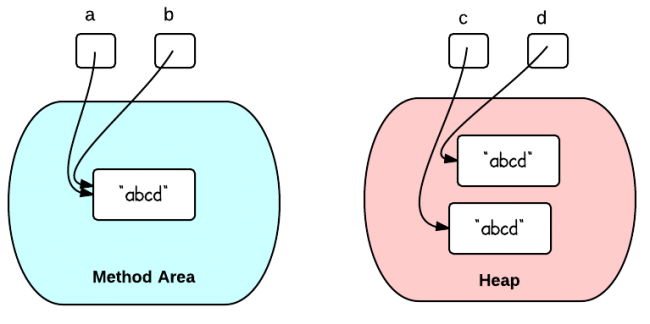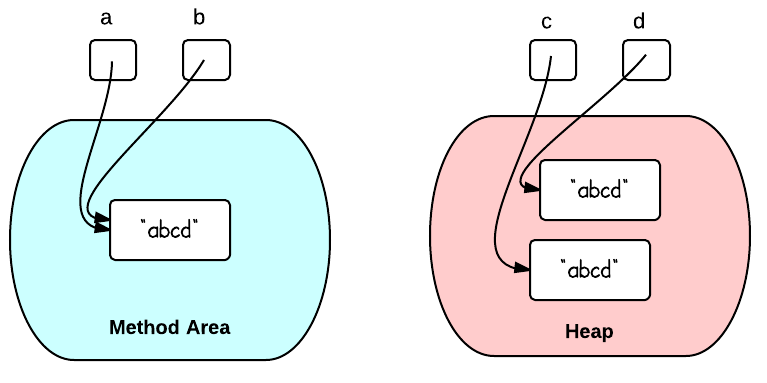In Java, a string can be created in two ways:
String x = "abc"; String y = new String("abc"); |
What is the difference between using the double quotes and using the constructor?
1. Double Quotes vs. Constructor
This question can be answered by using two simple examples.
Example 1:
String a = "abcd"; String b = "abcd"; System.out.println(a == b); // True System.out.println(a.equals(b)); // True |
a==b is true because a and b are referring to the same string literal in the method area. The memory references are the same.
When the same string literal is created more than once, only one copy of each distinct string value is stored. This is called “string interning“. All compile-time constant strings in Java are automatically interned.
Example 2:
String c = new String("abcd"); String d = new String("abcd"); System.out.println(c == d); // False System.out.println(c.equals(d)); // True |
c==d is false because c and d refer to two different objects in the heap. Different objects always have different memory references.
This diagram illustrate the two situations above:

2. Run-Time String Interning
Thanks to LukasEder (his comment below):
String interning can still be done at run-time, even if two strings are constructed with constructors:
String c = new String("abcd").intern(); String d = new String("abcd").intern(); System.out.println(c == d); // Now true System.out.println(c.equals(d)); // True |
3. When to Use Which
Because the literal “abcd” is already of type String, using constructor will create an extra unnecessary object. Therefore, double quotes should be used if you just need to create a String.
If you do need to create a new object in the heap, constructor should be used. Here is a use case.

in jdk 1.6 is also true
Sir I am newly joined Java programming certificate course my preceptor give me an project & I am stack on it for instance sir kindly advice me that how could I will manage program where I using string,double,integer variable in simultaneously please give some example.
This is how one writes code nobody can understand. Good way to be top of the list come next layoff. I knew a guy did the same crap wit C++, so ‘highly optimized” nobody could read it, and it also didn’t work but broke in mysterious ways. Rather than seeing how obtuse you can code, see how readable you can. Readability is FAR more cost effective than so-called highly optimized code.
Thank you for your share 😛
You are worng, In JDK1.6 and JDK1.7 return true. Test rourself
String c = new String(“abcd”).intern();
String d = new String(“abcd”).intern();
System.out.println(c == d); // True in JDK1.7 while false in JDK 1.6.
correct me if i am wrong
good to know, thanks
That’s not entirely correct. In your example, the compiler will already make sure that the same string constant is effectively referenced. String interning can still be done at runtime, even if two strings are constructed with constructors:
String c = new String(“abcd”).intern();
String d = new String(“abcd”).intern();
System.out.println(c == d); // Now true
System.out.println(c.equals(d)); // True